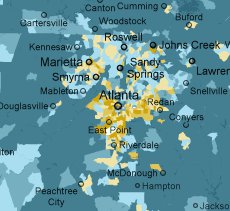 Google Reader gave me a link to a NY Times interactive map of census data and I learned some important lessons about gentrification and urban development.
Google Reader gave me a link to a NY Times interactive map of census data and I learned some important lessons about gentrification and urban development.
I knew, for instance, that my own neighborhood has been whitening up this decade, as have areas around it. In fact, the map suggests my own census tract, covering the east side of Kirkwood, is now 49% white, 46% black, which surprised me a little because previous estimates were we were still majority black.
No matter. The big news is that the population of the tract in 2010 was 2,444, down 9.8% from the year 2000.
Now, I knew that Decatur has been whitening-up (with McMansions no less) during this time, so I clicked over to the Oakhurst tract. Yes, they're now 61% white. But the population of that tract is also up 8.7% during the decade, to 4,433.
This suggests a two-step process to gentrification. Step one is that whites in singles or couples move in, while black families move out. That's what has happened this decade in Kirkwood. Step two is that the population starts expanding again, as families grow once the new economic and social order is established. This is what is happening in Oakhurst.
And it's not all about the schools. Populations are increasing in many Atlanta city neighborhoods where white singles replaced black families in the 1990s. Places like Inman Park, Grant Park, and Midtown have up to 20% more people than a decade ago.
The big population losses in Atlanta are in areas inhabited by poorer black folks, who I believe are moving to the suburbs, to places like Clayton County, South DeKalb, Norcross and Smyrna. What they've left is a lot of land, available for development, cheap. Only it's currently patrolled by criminals – white folks are scared of the south and west sides because of its reputation for crime.
But the captain of our local police precinct told our latest neighborhood meeting he lives on the south side, has lived there for 15 years, and likes it.
Personally I'd like to live in a balanced city, one that's growing in population and wealth. Thanks in large part to the housing bust, which decimated poor black areas where sub-prime lenders went door to door convincing old ladies their homes were worth a fortune, then foreclosed en masse, Atlanta's population declined this decade, even as its demographic balance shifted.
But if my neighborhood and those around it are any indication, gentrification is a two-step process, and we've just taken the first step.
If you want to make some serious money in the next decade, consider Atlanta real estate.










long distance relocations
Dana Blankenhorn: Census Lessons on Gentrification